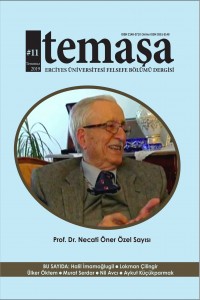Abstract
Burada, evrensel, nesnel ve genel geçerli bir etik arayışı içinde olan Kant’ın ahlak anlayışı; ahlak felsefesi genel hatlarıyla sunulacaktır.
Bilgide ulaştığı kesinliğe koşut bir kesinliği mutlak saydığı ahlak ilkelerinde de gerçekleştirmek amacında olan Kant, bu
nedenle, evrensel bir etik arayışı içindedir ki, bu, bir akıl ahlakıdır. Bu ahlakın kuruluşunda kurucu ögeler ise, iyi istenç, koşulsuz
buyruk (kategorik emperatif; ahlak yasası), özgürlük, ödev ve yükümlülük kavramlarıdır. Kant, bize, nasıl davranmamız gerektiğini
belirleyen ahlak ilkelerini saptamak ve bu ilkelerin uygulanışına elverişli bir dünya kurmak ister. Bu nedenle, bilgide ulaştığı
kesinliğe ahlakta da, mutlak saydığı ahlak ilkeleri aracılığıyla ulaşmak ister. Bu amaçla, ahlaka ilişkin aksiyomların da tıpkı matematiğin
ve fiziğin aksiyomları gibi sentetik a priori nitelikte olduğunu ispat etmeye çalışır; bu suretle ahlakın niteliği sorununu
ahlakın aksiyomlarının niteliği sorununa indirger. Aksiyomların niteliğine ilişkin sorunsal çözümlenmedikçe ahlakın ne olduğu
sorununun çözümlenemeyeceğini ısrarla belirtir. Ona göre, ahlakın aksiyomları, geçerliği herkesçe kabul edilebilir nitelikte bir
tek aksiyoma indirgenebilir. O, ‘kategorik emperatif’ ya da ‘ahlak yasası’ olarak adlandırdığı bu aksiyomu şöyle dile getirir: “Öyle
davran ki, eyleminin kuralı genel bir yasanın ilkesi yapılabilsin.”
Keywords
References
- Aydın, Mehmet. Kant ve Çağdaş İngiliz Felsefesinde Tanrı-Ahlak İlişkisi. Ankara: Ümit Mtb., 1981.
- Erişirgil, Mehmet Emin. Kant ve Felsefesi. İstanbul: Eko Mtb.,1997.
- Heimsoeth, Heinz. Immanuel Kant’ın Felsefesi. çev. Takiyettin Mengüşoğlu. İstanbul: İstanbul Mtb, 1967.
- Kant, Immanuel. Critique of Practical Reason. trans. by. L.W. Beck. Indiana Polis: The Bobbs-Merrill, 1956.
- Kant, Immanuel. Pratik Aklın Eleştirisi. çev. İoanna Kuçuradi. Ülker Gökberk, Füsun Akatlı, Ankara: H.Ü. Yayınları, 1980.
- Kant, Immanuel. Ahlak Metafiziğinin Temellendirilmesi. çev. İoanna Kuçuradi. Ankara: Türkiye Felsefe Kurumu Yayınları, 1995.
- Kant, Immanuel. The Critique of Judgement. trans. James Creed Meredith. Oxford: Clarendon Press, 1957.
Abstract
Is possible in terms of universal ethics? As it is obvious in the title, we present here the moral philosophy of Kant who seeks for a
universal, an objective and a de facto ethics understanding. Having an aim of reaching to certainty in ethics, just as he has achieved
in knowledge, Kant is in search of a universal ethics that is actually mind ethics. In the establishment of this kind of ethics, the
foundational elements, here, are the concepts of good will, unconditional imperative (categorical imperative; moral law), freedom,
duty and obligation. Kant wants to determine the moral principles specifying how we should act and to create a world that enables
to perform those principles. Therefore, he desires to reach to the certainty in ethics, just like he did in knowledge, through moral
principles that he considers as absolute. With this aim in mind, he aspires to prove that the axioms in ethics are a priori just like the
axioms in physics and mathematics. In this way, he degrades the problem of quality of ethics to the problem of the axioms of ethics.
He harps that we cannot analyze the problem of what ethics is about unless investigating the problem of the quality of axioms.
According to Kant, axioms of ethics can be degraded to only one axiom whose reality is accepted by everyone. He expresses this
axiom, which he names as ‘categorical imperative’ or ‘the code of ethics’, via these words: “Act as if the maxim of your action were
to become through your will a universal law of nature.”
Keywords
Ethics Freedom Maxime Categorical Imperative Duty Obligation
References
- Aydın, Mehmet. Kant ve Çağdaş İngiliz Felsefesinde Tanrı-Ahlak İlişkisi. Ankara: Ümit Mtb., 1981.
- Erişirgil, Mehmet Emin. Kant ve Felsefesi. İstanbul: Eko Mtb.,1997.
- Heimsoeth, Heinz. Immanuel Kant’ın Felsefesi. çev. Takiyettin Mengüşoğlu. İstanbul: İstanbul Mtb, 1967.
- Kant, Immanuel. Critique of Practical Reason. trans. by. L.W. Beck. Indiana Polis: The Bobbs-Merrill, 1956.
- Kant, Immanuel. Pratik Aklın Eleştirisi. çev. İoanna Kuçuradi. Ülker Gökberk, Füsun Akatlı, Ankara: H.Ü. Yayınları, 1980.
- Kant, Immanuel. Ahlak Metafiziğinin Temellendirilmesi. çev. İoanna Kuçuradi. Ankara: Türkiye Felsefe Kurumu Yayınları, 1995.
- Kant, Immanuel. The Critique of Judgement. trans. James Creed Meredith. Oxford: Clarendon Press, 1957.
Details
| Primary Language | Turkish |
|---|---|
| Journal Section | Review |
| Authors | |
| Publication Date | July 24, 2019 |
| Submission Date | March 3, 2019 |
| Published in Issue | Year 2019 Issue: 11 |

